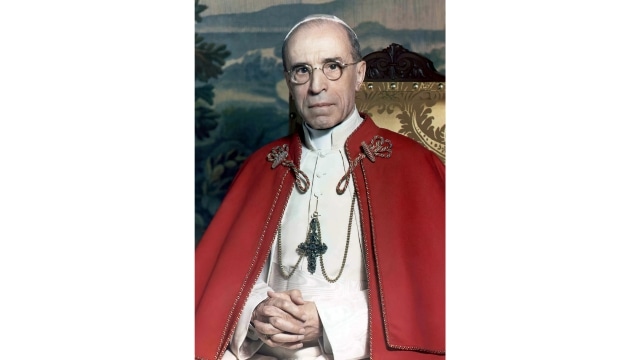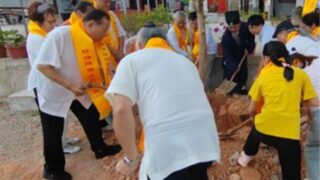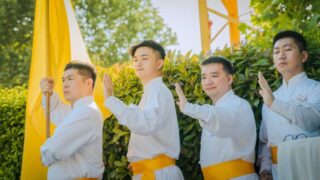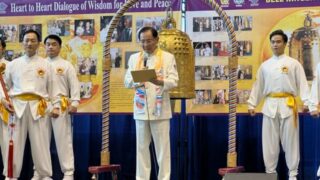Peace is the most important expression of human sociality, and always goes hand in hand with justice. Peace in Taiwan needs a solution of the Tai Ji Men case.
by Marco Respinti*
*Conclusions of the International webinar “Will Tai Ji Men Finally Be Allowed to Live in Peace?” co-organized by CESNUR and Human Rights Without Frontiers on May 16, 2023, United Nations International Day of Living Together in Peace.


Peace is the most desirable of human goals. At the same time, it is surely the most difficult social condition to reach.
Peace is the most desirable of human goals because it is the ideal on which human beings concentrate all their hopes and desires. When we humans say “peace,” we in fact envision a condition of serenity in which things happen in harmony, people try to help each other, and common good is possible.
We do not of course mean that all should be perfect, because perfection does not belong to the human realm. What we mean is a condition in which things, though not perfect, can be handled smoothly and through mutual understanding, avoiding conflict. Even problems may be dealt with in peace, if we have the right attitude to face them calmly and sincerely.
Peace is a state of mind. Many times, in this series of webinars on the Tai Ji Men case, we defined peace as a spiritual achievement. We also repeatedly underlined that peace is not only the absence of war. There are many conflictual situations that can destroy peace among human beings without involving an open warfare fought with weapons. And peace is also not pacifism, or an ideology that ends up offering a caricatural solution to serious problems.
Let me express this through the words of Pope Pius XII from a speech he delivered in 1952 to a famous association that had the term “peace” in its own Latin name, Pax Christi (“The Peace of Christ”). “The Church,” he said, “believes in peace and will not be tired of reminding to responsible statesmen and politicians that even today’s political and economic complications can be resolved amicably with the goodwill of all parties concerned. On the other hand, the Church must take into account the dark powers that have always operated in history. This is also why she is wary of any pacifist propaganda in which the word peace is abused to disguise unconfessed aims.” These were the years at the heart of the Cold War, and the Pope warned that peace should not be confused with surrender and compromise.


This is the true important point. No compromise can be admitted with error and evil. If humans compromise with error and evil, they will never have peace. This is why peace always goes hand in hand with justice.
Peace is the sum or, better, the common name of all things we aspire to in life for us and our beloved ones. There is one reason why peace is difficult to obtain. To secure peace, personal efforts are important but are not sufficient. Peace is a truly choral achievement and can be reached only when people work together, even labor together, and we all know how this is difficult. Nonetheless, peace would not be peace if it were only an individual enterprise.
Peace is in fact the most florid and rich expression of human sociality. Peace is itself a supreme social feature, and it is so desirable because it is compliant with the human nature. The Greek philosopher Aristotle (384–322 BC) famously defined humans as social human beings, meaning that sociality, and even sociability, or the attitude of being inclined to meet and spend time with other people, are intrinsic human characteristics. Even more: they are essential features of human nature. At this point, we can safely say that peace is the best expression of the intrinsic, characteristic, and unalienable social dimension of human beings.
If this is true, it means that to achieve peace, people should be led to discover again, appreciate, and follow their intimate human nature, where sociality and sociability lie. It means that even peace is the product of education, mutual education indeed, as most of human social issues are. What, after all, is our series of webinars on the Tai Ji Men case all about, if it is not a grand exercise in re-discovering the fundamental peaceful dimension of human relations though mutual education?
Webinar after webinar, we address a number of relevant topics, aptly connecting them to the Tai Ji Men case, to explore and rediscover what went wrong in human relations and try to suggest way of reparations. So, the Tai Ji Men case serves as an example of human unrest, and an opportunity to discuss solutions to it. The Tai Ji Men sufferings can teach many lessons about human distress.


In our webinars, we try to answer the question why the relations between the Tai Ji Men movement and some officials and branches of the Taiwanese government did not develop in the proper way. None of us has or ever had the magic wand to detect and solve problems immediately. We learn from each other, and try to see how things can be adjusted. This is called working toward peace.
After so many profound meetings and deep discussions, we have all understood that the Tai Ji Men case is an open wound in the concept of peace. Tai Ji Men Shifu, or Grand Master, and dizi, or disciples, have been offended and slandered, accused of crimes they did not commit, unjustly brought to court and even more unjustly detained, hit with the seizure of their sacred land and other properties, neglected in their basic human rights. We cannot call peaceful a country that allows this to happen and, even more seriously, do not redress this awful situation, once truth has been established and injustice done to Tai Ji Men proven several times.
Yes, Taiwan does not live in peace. It lives in the absence of war, but will not live in peace until the Tai Ji Men case remains unsolved. This is true for all of Taiwan, for all Taiwanese citizens. The Taiwanese government needs to guarantee peace to Tai Ji Men if it wants to guarantee peace to Taiwan.
The Taiwanese government needs to respond to the wrongdoings committed by some of its officials and branches, and restore justice, serenity, tranquility for Tai Ji Men. Only if it does it will peace be fully secured in Taiwan. As outside observers and commentators, we cannot dictate to the Taiwanese government the practical ways to do this. Any such pretense would be arrogant, unjust, and unnecessary. But we invoke peace on Taiwan and we ask the government of Taiwan, which we assume to be well-intentioned, to solve the Tai Ji Men case and make the country it rules a better place.









